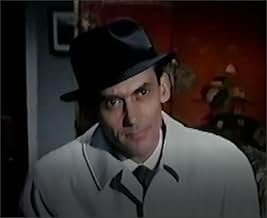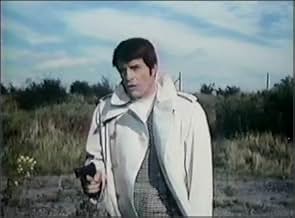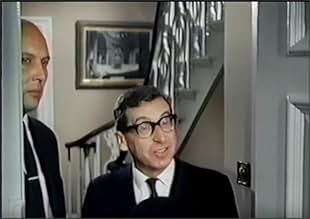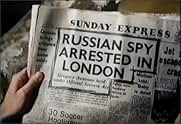Aggiungi una trama nella tua linguaA former British Secret Service agent is persuaded to negotiate a spy exchange with Russia, only to find himself drawn into political intrigues.A former British Secret Service agent is persuaded to negotiate a spy exchange with Russia, only to find himself drawn into political intrigues.A former British Secret Service agent is persuaded to negotiate a spy exchange with Russia, only to find himself drawn into political intrigues.
Carol Cleveland
- Girl
- (non citato nei titoli originali)
Trama
Lo sapevi?
- QuizAccording to a 15 January 1970 Associated Press report published two days day after the film's initial airing on ABC, the film ran about 12 minutes short because someone started the projector for part two of the film while several minutes of film were left on the projector unreeling part one. Per the AP: "This resulted in the omission of a big chunk of action in mid-program and panic at the studio when the program unexpectedly ended early. They grabbed a handy reel of film and slammed it on the air. ... Almost 350 viewers called ABC to ask what was wrong. And two called to congratulate the network on the filler program, a minidocumentary on the Revolutionary War that was never finished."
- BlooperBlake Butler is misspelled 'Blacke' Butler in the opening credits.
- ConnessioniFollows The Spy Killer (1969)
Recensione in evidenza
Due, in part, to President Kennedy's affinity to the Ian Fleming novels, and the seemingly endless "Cold War," the 60's saw the founding of the spy movie genre as we now know it. After the Bond movies made box office gold, there were soon other franchises such as the "Flint" movies and the "Matt Helm" and "Harry Palmer" franchises. While the Harry Palmer films were serious spy stories, most of the competing franchises were more spoofs of the Bond series than serious spy films. The Bond films eventually devolved into less serious spy films as well, until the Daniel Craig era brought things back to a more serious tone.
When the spy movie era arrived, television jumped on the bandwagon right away. There were series such as "The Man From Uncle" and "I Spy" which sought to cash in on the spy genre. However, other than these regular series, there was only one "made for TV" spy movie franchise known to this writer and that was the John Smith series. This series has simply not been given the attention deserved as these are very good stories in the John le Carre' or "Harry Palmer" tradition. They were made in Pinewood Studios in Britain (where many of the early Bond films were made) and enjoyed a British flair to their production. These movies stand out as excellent spy movies (with a strong film noir feel to them) albeit made for the ABC movie of the week time slot which limited them to 75 minutes each. This is the only draw back in these films—the editing to fit the time slot sometimes moved the story too quickly.
Robert Horton was cast as the lead character. This was quite a departure for him since he had been primarily an actor in westerns prior to filming "The Spy Killer" and its follow-up film "Foreign Exchange." After his departure from "Wagon Train" there was briefly talk of him starring in a private eye series but this never came to pass. He continued to play characters from the old west until this series. Horton was a good actor and a good choice for this franchise as he had good screen presence and was convincing in the role. John Smith is a former operative of the C.I.A. and, later, British Intelligence and has been an assassin for his English boss "Max"--- played exquisitely by Sebastian Cabot. Smith has retired from the spy business because he was forced to kill someone who "didn't have it coming." Jill St. John plays his girlfriend during her long hair period when, in this writer's humble opinion, she was her most beautiful. Her acting in this is actually pretty good for sometimes she has been called upon to be eye candy rather than a serious actor.
The novels that these films were based upon were written by Jimmy Sangster (Britain's answer to America's Richard Matheson, with more of a bent for film noir) who wrote only two novels in the John Smith series, viz "Private, I" (which became "The Spy Killer") and "Foreign Exchange." The stories are serious spy stories, without the flashy cars or gadgets and constant gun play. Indeed, Smith's pistol is kept in a safe deposit box and it is a Colt 1911 A-1 Army model—the kind of gun to which a former military man might have an affinity. Sangster keeps everyone guessing as to who will double cross whom next. The beauty of these films is that, as in the real world of espionage, nothing is to be trusted or taken at face value. The plot and dialogue of both films are extremely good (which tends to be the case with British productions—face it, the Brits are more artful with the language than most Americans).
These films would be the last starring roles for Robert Horton in a movie, for he would soon take his career to the stage and Broadway and only occasionally appear thereafter on TV or in film. It is a pity that three or four additional installments to the series did not come to pass for it was a great character. But, like the Flint saga, it ended after only two movies. This writer hopes and predicts that, now that Robert Horton has passed away, these films will be rediscovered. Good luck finding copies of these films. "The Spy Killer" is available on Amazon in a DVD with four other old movies, but "Foreign Exchange" is currently only available in bootleg copies.
When the spy movie era arrived, television jumped on the bandwagon right away. There were series such as "The Man From Uncle" and "I Spy" which sought to cash in on the spy genre. However, other than these regular series, there was only one "made for TV" spy movie franchise known to this writer and that was the John Smith series. This series has simply not been given the attention deserved as these are very good stories in the John le Carre' or "Harry Palmer" tradition. They were made in Pinewood Studios in Britain (where many of the early Bond films were made) and enjoyed a British flair to their production. These movies stand out as excellent spy movies (with a strong film noir feel to them) albeit made for the ABC movie of the week time slot which limited them to 75 minutes each. This is the only draw back in these films—the editing to fit the time slot sometimes moved the story too quickly.
Robert Horton was cast as the lead character. This was quite a departure for him since he had been primarily an actor in westerns prior to filming "The Spy Killer" and its follow-up film "Foreign Exchange." After his departure from "Wagon Train" there was briefly talk of him starring in a private eye series but this never came to pass. He continued to play characters from the old west until this series. Horton was a good actor and a good choice for this franchise as he had good screen presence and was convincing in the role. John Smith is a former operative of the C.I.A. and, later, British Intelligence and has been an assassin for his English boss "Max"--- played exquisitely by Sebastian Cabot. Smith has retired from the spy business because he was forced to kill someone who "didn't have it coming." Jill St. John plays his girlfriend during her long hair period when, in this writer's humble opinion, she was her most beautiful. Her acting in this is actually pretty good for sometimes she has been called upon to be eye candy rather than a serious actor.
The novels that these films were based upon were written by Jimmy Sangster (Britain's answer to America's Richard Matheson, with more of a bent for film noir) who wrote only two novels in the John Smith series, viz "Private, I" (which became "The Spy Killer") and "Foreign Exchange." The stories are serious spy stories, without the flashy cars or gadgets and constant gun play. Indeed, Smith's pistol is kept in a safe deposit box and it is a Colt 1911 A-1 Army model—the kind of gun to which a former military man might have an affinity. Sangster keeps everyone guessing as to who will double cross whom next. The beauty of these films is that, as in the real world of espionage, nothing is to be trusted or taken at face value. The plot and dialogue of both films are extremely good (which tends to be the case with British productions—face it, the Brits are more artful with the language than most Americans).
These films would be the last starring roles for Robert Horton in a movie, for he would soon take his career to the stage and Broadway and only occasionally appear thereafter on TV or in film. It is a pity that three or four additional installments to the series did not come to pass for it was a great character. But, like the Flint saga, it ended after only two movies. This writer hopes and predicts that, now that Robert Horton has passed away, these films will be rediscovered. Good luck finding copies of these films. "The Spy Killer" is available on Amazon in a DVD with four other old movies, but "Foreign Exchange" is currently only available in bootleg copies.
I più visti
Accedi per valutare e creare un elenco di titoli salvati per ottenere consigli personalizzati
Dettagli
- Data di uscita
- Paese di origine
- Lingua
- Celebre anche come
- Geheimagent John Smith: Spion zum Austausch
- Luoghi delle riprese
- Eaton Place, Belgravia, Londra, Inghilterra, Regno Unito(Taxi drives down in the opening credits)
- Aziende produttrici
- Vedi altri crediti dell’azienda su IMDbPro
Contribuisci a questa pagina
Suggerisci una modifica o aggiungi i contenuti mancanti

Divario superiore
By what name was Foreign Exchange (1970) officially released in Canada in English?
Rispondi


























